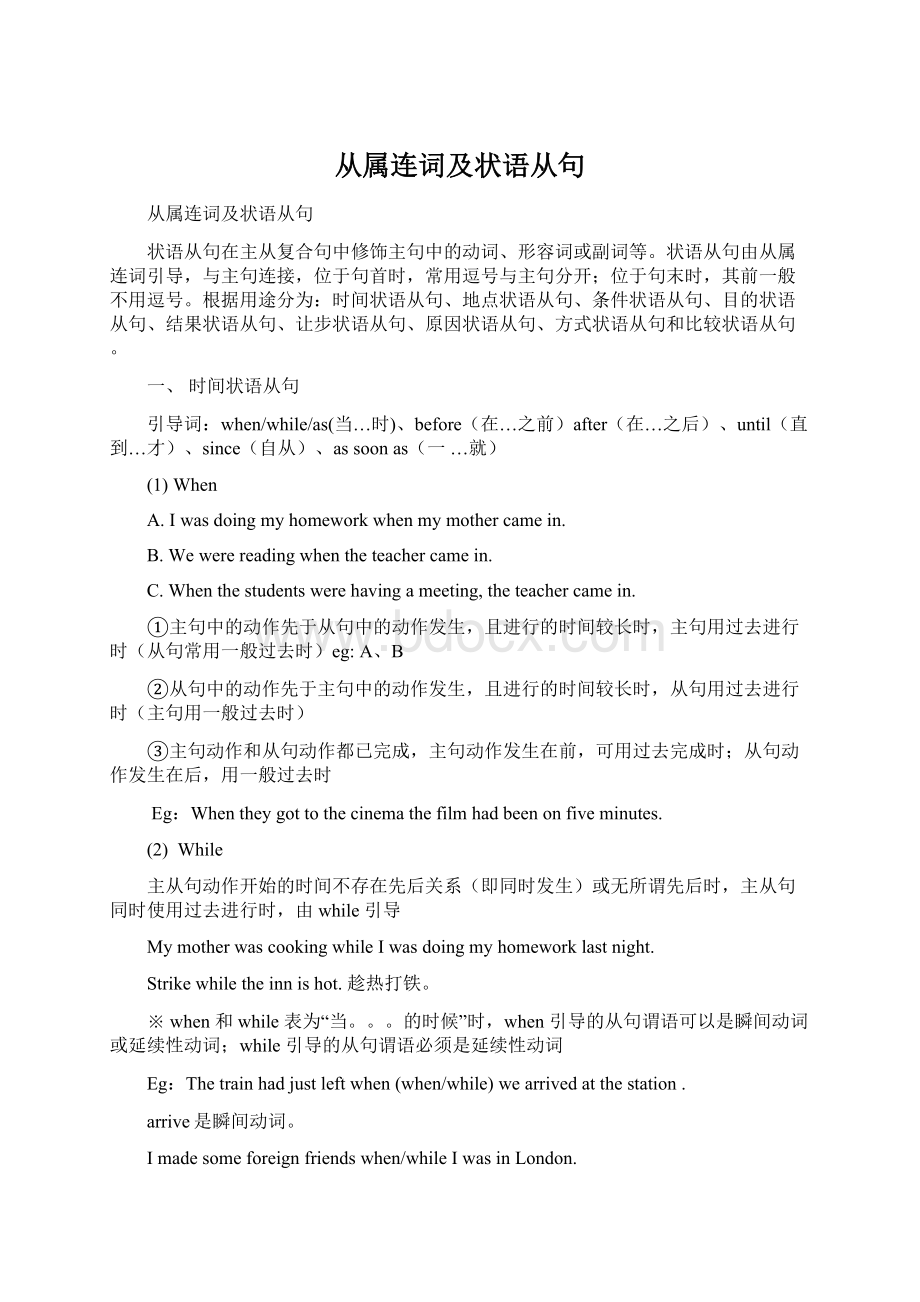从属连词及状语从句.docx
《从属连词及状语从句.docx》由会员分享,可在线阅读,更多相关《从属连词及状语从句.docx(14页珍藏版)》请在冰豆网上搜索。

从属连词及状语从句
从属连词及状语从句
状语从句在主从复合句中修饰主句中的动词、形容词或副词等。
状语从句由从属连词引导,与主句连接,位于句首时,常用逗号与主句分开;位于句末时,其前一般不用逗号。
根据用途分为:
时间状语从句、地点状语从句、条件状语从句、目的状语从句、结果状语从句、让步状语从句、原因状语从句、方式状语从句和比较状语从句。
一、时间状语从句
引导词:
when/while/as(当…时)、before(在…之前)after(在…之后)、until(直到…才)、since(自从)、assoonas(一…就)
(1)When
A.Iwasdoingmyhomeworkwhenmymothercamein.
B.Wewerereadingwhentheteachercamein.
C.Whenthestudentswerehavingameeting,theteachercamein.
①主句中的动作先于从句中的动作发生,且进行的时间较长时,主句用过去进行时(从句常用一般过去时)eg:
A、B
②从句中的动作先于主句中的动作发生,且进行的时间较长时,从句用过去进行时(主句用一般过去时)
③主句动作和从句动作都已完成,主句动作发生在前,可用过去完成时;从句动作发生在后,用一般过去时
Eg:
Whentheygottothecinemathefilmhadbeenonfiveminutes.
(2)While
主从句动作开始的时间不存在先后关系(即同时发生)或无所谓先后时,主从句同时使用过去进行时,由while引导
MymotherwascookingwhileIwasdoingmyhomeworklastnight.
Strikewhiletheinnishot.趁热打铁。
※when和while表为“当。
。
。
的时候”时,when引导的从句谓语可以是瞬间动词或延续性动词;while引导的从句谓语必须是延续性动词
Eg:
Thetrainhadjustleftwhen(when/while)wearrivedatthestation.
arrive是瞬间动词。
Imadesomeforeignfriendswhen/whileIwasinLondon.
(3)before.在...之前。
表示主句的动作发生咋从句的动作之前。
Takethemedicinebeforeyougotobed.
(4)after在。
。
。
之后。
表示主句的动作发生在从句的动作之后。
Afterhehadfinishedhiscomposition,helefthisoffice.
(5)assoonas…就。
从句的动作发生,主句的动作随即发生(主将从现)
IwillringyouassoonasIgetthere.
ItriedtocallyouassoonasIheardfromyou,butyouwerenotin.
即当主句时态是过去时,从句的时态也用过去时。
(6)since自…以来
1>主句(现在完成时)+since+从句(一般过去时)
2>Itis+时间+从句(一般过去时)
Ithasbeen+时间+since+从句(一般过去时)
3>since从句的谓语动词必须是延续性的词
Eg:
HehasworkedinthisschoolsincehegraduatedfromBJnormaluniversity.
Eg:
ItistenyearssinceIbegantostudyEnglish.
Eg:
Ithasbeen8yearssinceIstudiedEnglish.
Eg:
DoyouknowBettywell?
Yes,sheandIhavebeenfriendssincewemetinGuangzhoulastsummer.
Eg:
Oh,dear!
Surprisedtomeetyouhere._____sincewesawlasttime.
Ithaslongtimenosee.
A:
ItisalongtimeB:
HowImissyou.
C:
Ihavn’tseenyouDIt’sbeenalongtime
(7)until/till
1>主句的谓语动词是延续性动词时,主句用肯定形式,表示这一动作或状态一直延续到until/till所表示的时间为止。
I’llwaitforyoutillyoucometoseeme.
I’llwaituntiltherainstops.
2>当主句是否定句时,主句谓语动词应是瞬间动词
主句的动作发生在从句的动作之前
构成句式:
not……until有时不用not,而用never(hardly)、nothing(none)等表示否定的词
Ididn’tgotobeduntilIfinishedmyhomework.
Iwon’tleavemyofficeuntilmyworkisfinished.
这时的until可用before来替换。
Leave是瞬间动词
Ihardlyknewanythingaboutituntilyoutoldme.
A.sinceB.afterC.untilD.when
※在下列情况下,时间状语从句必须用一般现在时(since引导的时间状语从句除外)
①主句时态是一般将来时
②主句中有情态动词can、may、must、hadbetter等
③主句是祈使句
二、条件状语从句
引导词:
if(如果)、aslongas(只要)、unless(除非)
⑴if主句为一般将来时,从句用一般现在时
I’llvisittheGreatWallifitdoesn’traintomorrow.
⑵如果if引导的条件状语从句所表示的前提或条件将来可以实现或正在进行。
动词要用现在完成时或进行时。
主句通常用将来时
Wewillgiveyouagoodpriceifyouarethinkingofbuyingit.
⑶”祈使句and/or引导的结果状语从句”中,祈使句在意义上相当于一个条件状语从句
Hurryup、orelse/otherwiseyou’llbelate
Useyourhead,andyou’llfindaway.=Ifyouuseyourhand,you’llfindaway.
※在下列情况下,if引导的条件状语从句必须用一般现在时;
①主句时态是一般将来时
②主句中有情态动词can、may、must、hadbetter等
③主句是祈使句
Lucymayfallbehindherclassmatesifshedoesn’tstudyhard.
Pleasecallmeifmanycomestomorrow.
Ifyoustillhaveanyotherquestions,pleaseputupyourhands.
练习;
1Studyhard,andyou’llmakegreatprogress.(改成同义句)
Ifyoustudyhard,you’llmakegreatprogress.
2Studyhard,oryouwillfallbehindtheothers.
Ifyoudon’tstudyhard,youwillfallbehindtheothers.
③——Idon’tknowifit__________tomorrow。
——Wewon’tgohikingifit______________tomorrow.
A.willrain;willrainB.rains;rains
C.willrain;rainsD.rains;willrain
※if从句和so从句的混用
①Ifkategoestothecinema,______________
A.sodoesTomB.sowillTomC.neitherwillTomD.neitherdoes
②——Iwonderifyourwifewillgohiking.
——Ifyourwife___________,so____________.
A.does;doessheB.will;willmine
C.does;willmineD.will;willher
③IfJimdoesn’tgoswimmingtomorrow_____________
A.sodoesTomB.sowillTom
C.neitherwillTomD.neitherdoesTom
三、原因状语从句
Because(原因)since(既然)as(由于)for(由于)
1because
Eg:
①Hedidn’tgotoschoolbecausehewasill.
②Hewasangrybecausewemadeanoise.
③______waterisveryimportanttous,weshouldprotectourriversandlakes.
A.SoB.ThoughC.IfD.As
④_________youarenotfeelingwell,you’dbetterstayathome.
A.BecauseB.SinceC.OrD.But
⑤_________itwasraininghard,wehadtobeindoors.
A.AsB.BecauseC.AndD.So
⑥AfterschoolIfoundmotherwassickinbed.________motherwasill,Ishoulddosomethingforher.
A.SoB.ThoughC.SinceD.If
原因状语从句通常用because、since、as引导,这三个词所表示的语气由because到as逐渐减弱。
由why提出的问题用because来回答
Because表示原因语气最强,经常表示作者未知的原因
——Whyareyoulate?
——BecauseI’mill.
※又可以在强调句型中成为被强调的部分
Itisbecauseyouarelazythatyouhavelostthejob.
正因为你懒惰才失去了工作
⑵since次于because引导的从句,常表示稍加分析后推断出来的原因或指的是人们已知的事实
Sincenooneisagainstit,let’scarryouttheplan.
Sinceyoucan’tanswerthequestion,youcanasksomeoneforhelp.
⑶as语气最弱,其原因只是对结果的附带说明,可以放在主句前或主句后
You’dbetterwearstrongshoesaswe’lldoalotofwalking.
※because表为“因为”,强调未知原因,是句中较重要的部分,它用来回答why的提问,because从句放在主句之后
since、as意思是“既然、由于”,表示显而易见的原因,是句中不甚重要的部分,更强调结果。
Since、as引导的从句常放在主句之前。
Since比as正式,再者都不能回答why的提问
※asaresultof(因为)、becauseof(因为)、thanksto(多亏、由于)
A.Thankstothebadweatherthisspring,thecropsarenorgrowingquitewell.
B.Thesportsmeetingwasputoffbecausetheweatherwasbad.
Thesportsmeetingwasputoffbecauseofthebadweather.
⑷for属并列连词,但不是说明直接原因,而是对某种情况加以推断,用于表示补充说明理由
Hemustbeill,forheisabsenttoday.
Thedaysareshort,foritisnowDecember.白天短了,因为现在已经是12月了。
四、目的状语从句
⑴sothat(以便、为了)、inorderthat(为了)等谓语中常含有may、might、can、could、will、would等情态动词
Eg:
①Hemustgetupearlysothathecancatchthefirstbus.
②IsitinthefrontoftheclassroomsothatIcanseeclearly.
⑵当补句主语与主句一致时,可用soasto,inorderto
Heworkeddayandnightinorderthathecouldsucceed.=
Heworkeddayandnightinordertosucceed.
五、结果状语从句
So…that/such…that(如此。
。
。
以至于)sothat(结果是)
⑴sothat引导的目的状语从句与sothat引导的结果状语从句
a.目的状语从句一般使用情态动词,结果状语从句一般不使用情态动词
b.结果状语从句只能放在句末
c.结果状语从句常常用逗号与主句分开
I’llwashthedresssoonsothatyoucanwearittomorrow.
我会很快把这条裙子洗一洗,好让你明天穿(目的状语从句)
Theroofhadfallenin,sothatthehutwasoutofuse.
屋顶塌陷,所以小屋不能住了(结果状语从句)
⑵so…that与such…that区别
1so…that句型中,so是副词,其后接形容词或副词
so+adj./adv+that
so+adj.+a/an+单数名词+that
somany/few+复数名词
sosuch/little+不可数名词
Sheissolovelyagirlthatweloveherverymuch.
It’ssohotthatnobodywantstogoout.外面太热以至于没人想出去
Wehavesomuchtimethatwecanfinishtheworkverywell.
2So…that句型的否定形式可用“too…to…”或“not…enoughto”代替
Heissoyoungthathecan’tgotoschool.
=Heistooyoungtogotoschool.
=Heisnotoldenoughtogotoschool.
3Such+a/an+adj.+单数名词+that
Such+形容词+复数名词+that
Such+形容词+不可数名词+that
Sheissuchanhonestwomenthateverybodytrusther.
ItissuchniceweatherthatIdon’tliketostayathome.
天气这么好,我不想呆在家里
Sheissuchalovelygirlthatweloveherverymuch.
六、让步状语从句
引导词:
though/although(尽管、虽然)、evenif(即使)、whatever(无论什么)、wherever(无论哪里)、whenever(无论何时)、eventhough(即使)
⑴though/although虽然、尽管
Though/althoughitwasveryhot,hekeptonworking.
尽管天气很热他还是坚持工作
※①注意though与although语义相同,两者可换用。
但although比though语气主句中可以用yet,still,nevertheless与其呼应,但不可使用but
ThoughIbelieveit,yetImustconsider.
虽然相信这一点,但我还得考虑考虑
2though可作副词,放在句末,意为“不过,但是”,although无此用法
Hesaidhewouldhelpme;hedidn’tthough.
他说他会帮我的,但是他并没有帮我
③在短语eventhough及asthough中不可换用although
⑵eventhough和evenif“尽管”“即使”
这两个复合连词意义相同,常用以强调让步概念,会有退一步想的意思(有时用于虚拟语气)
Eg:
We’llmakeatripevenif/thoughtheweatherisbad.
即使天气很糟糕,我们也要去旅行
EvenifIwereinyourplace,Iwouldn’ttakethejob.
即使我在你的位置,我也不会接受这份工作(虚拟语气)
Hewillcomeevenifheisill.即使他病了他也会来的
Iwon’tgiveupevenifIshouldfailtentimes.
即使失败十次,我也不会放弃。
⑶whoever/nomatterwho(无论谁,不管什么人)、whatever/nomatterwhat(无论什么、不管什么样的)、whichever/nomatterwhich(无论哪个)
Whomever=nomatterwhom(无论谁、宾格)
Eg:
Whoever/nomatterwhoyouare,youmustobeythelaw.
无论你是谁,你都得守法。
Don’tloseheart,whatever/nomatterwhathappens.
不管发生什么都不要气馁。
Somepeopleactregardlessofwhatwillhappenafterwards.
有些人做事根本不管后果。
七、地点状语从句
引导词:
where(…的地方)、wherever(无论哪里)
Eg:
Wemustcampwherewecangetwater.我在必须能找到水的地方露营。
Iwillfollowyouwheneveryougo.无论你到哪里我都跟随你。
Wherethereisawill,thereisaway.有志者事竟成
Youarefreetogowhereveryoulike.你可以到任何你可以去的地方
Makeamarkwhereyouhaveanyquestions.在有疑问的地方做个记号
Sitwhereveryoulike.请随便坐
注意:
where与wherever区别
Wherever=to/atanyplacewhere
I’llgowherehewent.我要去他去的地方
I’llgowhereverhegoes.他去哪我就去哪。
(非特定地点)
※地点状语从句与定语从句的区别
While引导定语从句时,从句前应有一个表示地点的名词作先行词;而状语从句前则无先行词
Gobackwhereyoucomefrom。
你从何处来回到何处去。
(地点状语从句)
Gobacktothevillagewhereyoucamefrom。
回到你来的哪个村子里去
(引导定语从句修饰village)
Youhavetogoon,whatever/nomatterwhatdifficultiesyoumeet.
无论遇到什么困难,你都得继续下去
Whichever/nomatterwhichbookyouborrow,youmustreturnitinaweek.
※whatever、whoever、whomever、whichever等可引导名词性从句,也可引导让步状语从句而nomatterwhat/who/whom/which等只能引导让步状语从句
Eg:
Whoeverbreaksthelawwillbepunished.任何违反法律的人都应得到惩罚(引导主语从句,在从句中作主语)
Whatevershewantsisfinewithme.她无论要什么我都没意见
(引导主语从句,在从句中作宾语)
Whichever(ofyou)comesinfirstwillreceiveaprize,你们之中哪个先到达都先得到奖品。
(引导主语从句,在从句中作主语)
however/nomatterhow(不管怎样)、wherever/nomatterwhere(无论在何处)、whenever/nomatterwhen(无论何时)
Whenever/Nomatterwhenyoucomeback,don’twakemeup.
Hecarriesabookinhispocket,wherever/nomatterwherehegoes.
他不管去哪里,口袋里都带一本书
However/Nomatterhowlateheis,motherwillwaitforhimtohavedinnertogether.
Howevergoodabookitis,Ijustdon’tlikeit.
inspit